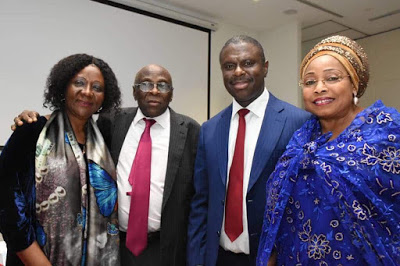Otunba Kunle Folarin, an expert in maritime
matters and trade economics, has in a review said the focus of the Africa
Continent Free Trade Area agreement (AfCFTA) is developing the Small and Medium
Scale Enterprises (SMEs) through the advantage of lower production cost,
service or deliveries to other countries.
matters and trade economics, has in a review said the focus of the Africa
Continent Free Trade Area agreement (AfCFTA) is developing the Small and Medium
Scale Enterprises (SMEs) through the advantage of lower production cost,
service or deliveries to other countries.
Folarin spoke in an interview recently
during the African Day of the Oceans and Seas celebration, organised by the Nigerian
Maritime Administration and Safety Agency (NIMASA) in Lagos.
during the African Day of the Oceans and Seas celebration, organised by the Nigerian
Maritime Administration and Safety Agency (NIMASA) in Lagos.
Folarin said that while the essence of the
free trade agreement aims at integrating the economies of the continent,
considering the policy of a single currency, customs union, trade and tariffs
as well as efforts at removing barriers to trade facilitation, Nigeria must now
consciously begin to develop its SMEs to satisfy local needs and export within
the region.
free trade agreement aims at integrating the economies of the continent,
considering the policy of a single currency, customs union, trade and tariffs
as well as efforts at removing barriers to trade facilitation, Nigeria must now
consciously begin to develop its SMEs to satisfy local needs and export within
the region.
He warned that it was not enough for
Nigeria to desire benefits from the agreement, rather, all necessary infrastructure
and policy for building strong SMEs should be put in place and consciously
driven sustainably.
Nigeria to desire benefits from the agreement, rather, all necessary infrastructure
and policy for building strong SMEs should be put in place and consciously
driven sustainably.
Folarin, therefore, advised that Nigeria should
develop areas where it has comparative advantage like the maritime trade and agric
exports, considering how well shipping could benefit from it. He said: “You
have to look at where you have comparative advantage. The maritime sector, export
of agriculture. Sadly though, we are still importing a lot of small-scale
industry materials from China.
develop areas where it has comparative advantage like the maritime trade and agric
exports, considering how well shipping could benefit from it. He said: “You
have to look at where you have comparative advantage. The maritime sector, export
of agriculture. Sadly though, we are still importing a lot of small-scale
industry materials from China.
“However, this is the right time to use the
advantage of our large population as a nation, when we can boost manufacturing
and enjoy the economic benefits of markets across the region.
advantage of our large population as a nation, when we can boost manufacturing
and enjoy the economic benefits of markets across the region.
“So, if we develop the small-scale industry
and we dominate the market, and we have a competitive edge in the market, it
means that our maritime sector will benefit, because we are going to start with
increase in shipping. They won’t be looking for foreign-going ships, competing
with Europe and Asian shipping line. They will be thinking of coast-wise
traffic, starting from Dakar to Gabon, West and Central Africa.
and we dominate the market, and we have a competitive edge in the market, it
means that our maritime sector will benefit, because we are going to start with
increase in shipping. They won’t be looking for foreign-going ships, competing
with Europe and Asian shipping line. They will be thinking of coast-wise
traffic, starting from Dakar to Gabon, West and Central Africa.
“If it is good, we can now go to the
Mediterranean, the North African countries, Morocco and Egypt. If it gets
better, we can go through Durban and go to East Africa. But basically, it is
the capacity to benefit. If you build ports and no cargo what will happen? If
you build economies as big as Nigeria and no Nigerian shipping interest built
to have the capacity to take part, what is the effect?” he asked.
Mediterranean, the North African countries, Morocco and Egypt. If it gets
better, we can go through Durban and go to East Africa. But basically, it is
the capacity to benefit. If you build ports and no cargo what will happen? If
you build economies as big as Nigeria and no Nigerian shipping interest built
to have the capacity to take part, what is the effect?” he asked.
Folarin, therefore implored the Nigerian
Ports Authority, ship owners, the manufacturing sector too that can be shipping
out with lower tariffs to ensure that the cluster drives its competitive edge profitably
in the sub-region.
Ports Authority, ship owners, the manufacturing sector too that can be shipping
out with lower tariffs to ensure that the cluster drives its competitive edge profitably
in the sub-region.
He also wants Nigeria to beware of consequences
that could arise from the advantages it could enjoy, considering that
industrialised countries could shift their manufacturing to their allied
African countries to come and compete with Nigeria.
that could arise from the advantages it could enjoy, considering that
industrialised countries could shift their manufacturing to their allied
African countries to come and compete with Nigeria.
It would be recalled that President
Muhammadu Buhari on July 7, 2019, signed the Agreement establishing the African
Continental Free Trade Area (AfCFTA) at the opening of the 12th Extraordinary
Session of the Assembly of AU Heads of State and Government in Niamey, Niger.
Muhammadu Buhari on July 7, 2019, signed the Agreement establishing the African
Continental Free Trade Area (AfCFTA) at the opening of the 12th Extraordinary
Session of the Assembly of AU Heads of State and Government in Niamey, Niger.
Buhari had also emphasised the need for policies that would promote African production among other benefits.

